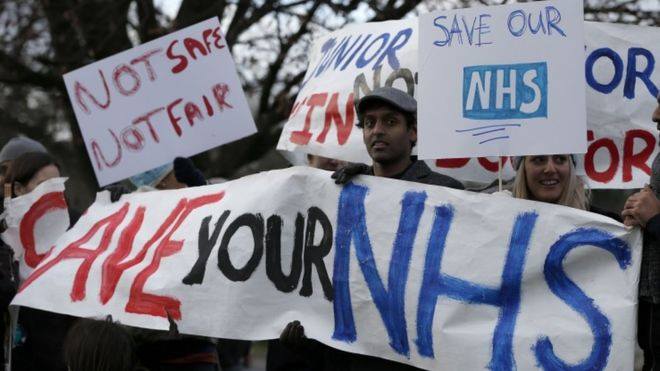Some 100,000 nurses are striking today across 76 hospitals and medical facilities in the U.K. over a pay dispute. It’s the first-ever nation-wide NHS in the country’s history. The demonstration comes at a time when hospitals are already stretched thin due to rising respiratory infections. Some 70,000 health appointments were canceled due to the disruption. It’s the first day of the strike with another demonstration planned for December 20 and health officials are bracing for more delays over the holidays.
“What a tragic day. This is a tragic day for nursing, it is a tragic day for patients, patients in hospitals like this, and it is a tragic day for people of this society and for our NHS,” said Pat Cullen, the head of the Royal College of Nursing (RCN) union, from the picket line.
Health Minister Steve Barclay said he was disappointed to see the strike go forward after the government refused to negotiate a possible pay increase. “I’ve been working across government and with medics outside the public sector to ensure safe staffing levels – but I do remain concerned about the risk that strikes pose to patients,” he said. “I do think it’s important that we have a constructive engagement, but it’s got to be reasonable.”
The striking nurses want a pay raise of 5% on top of the latest rate of inflation. They say they have been losing real-term pay over the last ten years due to the rising cost of living while facing critical staff shortages that put patients at risk. The loss of income only creates a vicious cycle as more nurses leave the profession in search of higher pay. The government says it doesn’t have the power to meet the nurses’ demands, which would inflate staffing costs by around 19%.
With talks at a standstill, Pat Cullen said the RCN may hold additional strikes in the new year.
“Every room I go into with the secretary of state, he tells me he can talk about anything but pay,” she said. “What it is going to do is continue with days like this.”
Ethnea Vaughan, 50, a practice development nurse at St. Thomas’ Hospital in London, said she felt she had no choice but to strike because the government isn’t willing to negotiate.
“Nothing is changing, and I’ve been in nursing for 27 years and all I can see is a steady decline in morale,” she told reporters.
Motorists honked their horns outside the demonstration taking place in Belfast. Dozens of nurses gathered outside Royal Victoria Hospital despite the freezing cold.
“I didn’t make this decision lightly … I decided it was time to say ‘enough’,” said Louise Mitchell, who has been a nurse for 40 years. “We don’t want patients to suffer any more. Patient care is suffering every day of every week in this country because there are not enough resources in the health service.”
Scotland managed to avoid the strike by holding talks with the nurses, which is what they are hoping to achieve in England, Wales, and Northern Ireland. But government officials in Scotland said they can’t afford to increase their pay by more than 4% to 5%. The solution was recommended by an independent body, which said that additional pay increases would mean taking money away from frontline medical services.
“It is time for us to make a stand, to protect our nurses and most importantly patient care,” said Paula Burne, 58, who has been a nurse with the NHS for nearly 40 years. “Nurses are leaving in the thousands, so all that experience and expertise is being lost. Striking is unprecedented in our profession – it really means something – we want the government to listen to us,” she added.
Marie Dixon, 39, said nurses’ “voices need to be heard.” “For many years, we have been ignored and expected to just get on with it – but it’s at a crisis point now. We can’t give the care we want to and I feel like it’s dangerous for us and for the public,” she added.
Nichola Ashby, the deputy director of the RCN, described it as a “very sad day.”
“We didn’t want to take action – but we were left with no choice,” Ashby said. “I believe the public is behind us all the way – they understand that this is about making sure we can deliver safe and effective care.”
Post Views: 310







